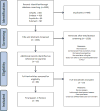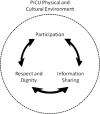Family-Centered Care From the Perspective of Parents of Children Cared for in a Pediatric Intensive Care Unit: An Integrative Review
- PMID: 29153934
- PMCID: PMC5955783
- DOI: 10.1016/j.pedn.2017.11.007
Family-Centered Care From the Perspective of Parents of Children Cared for in a Pediatric Intensive Care Unit: An Integrative Review
Abstract
Problem: The Institute for Patient- and Family-Centered Care's (IPFCC) definition of family-centered care (FCC) includes the following four core concepts: respect and dignity, information sharing, participation, and collaboration. To date, research has focused on the provider experience of FCC in the PICU; little is known about how parents of children hospitalized in the pediatric intensive care unit (PICU) experience FCC.
Eligibility criteria: Articles were included if they were published between 2006 and 2016, included qualitative, quantitative, or mixed methods results, related to care received in a PICU, and included results that were from a parent perspective.
Sample: 49 articles from 44 studies were included in this review; 32 used qualitative/mixed methods and 17 used quantitative designs.
Results: The concepts of respect and dignity, information sharing, and participation were well represented in the literature, as parents reported having both met and unmet needs in relation to FCC. While not explicitly defined in the IPFCC core concepts, parents frequently reported on the environment of care and its impact on their FCC experience.
Conclusions: As evidenced by this synthesis, parents of critically ill children report both positive and negative FCC experiences relating to the core concepts outlined by the IPFCC.
Implications: There is a need for better understanding of how parents perceive their involvement in the care of their critically ill child, additionally; the IPFCC core concepts should be refined to explicitly include the importance of the environment of care.
Keywords: Family-Centered Care; Institute for Patient and Family Centered Care; PICU; Parent.
Copyright © 2017. Published by Elsevier Inc.
Figures


Similar articles
-
Parents' experiences of transition when their infants are discharged from the Neonatal Intensive Care Unit: a systematic review protocol.JBI Database System Rev Implement Rep. 2015 Oct;13(10):123-32. doi: 10.11124/jbisrir-2015-2287. JBI Database System Rev Implement Rep. 2015. PMID: 26571288
-
Family-centered care in neonatal and pediatric critical care units: a scoping review of interventions, barriers, and facilitators.BMC Pediatr. 2025 Apr 14;25(1):291. doi: 10.1186/s12887-025-05620-w. BMC Pediatr. 2025. PMID: 40223058 Free PMC article.
-
The Scope of Family-Centred Care Practices, and the Facilitators and Barriers to Implementation of Family-Centred Care for Hospitalised Children and their Families in Developing Countries: An Integrative Review.J Pediatr Nurs. 2020 Nov-Dec;55:10-28. doi: 10.1016/j.pedn.2020.05.018. Epub 2020 Jul 3. J Pediatr Nurs. 2020. PMID: 32629368 Review.
-
The parents', hospitalized child's, and health care providers' perceptions and experiences of family centered care within a pediatric critical care setting: a metasynthesis of qualitative research.J Fam Nurs. 2013 Nov;19(4):431-68. doi: 10.1177/1074840713496317. Epub 2013 Jul 24. J Fam Nurs. 2013. PMID: 23884697
-
Child and Family Outcomes and Experiences Related to Family-Centered Care Interventions for Hospitalized Pediatric Patients: A Systematic Review.Children (Basel). 2024 Aug 6;11(8):949. doi: 10.3390/children11080949. Children (Basel). 2024. PMID: 39201884 Free PMC article. Review.
Cited by
-
Prediction of patient choice tendency in medical decision-making based on machine learning algorithm.Front Public Health. 2023 Feb 24;11:1087358. doi: 10.3389/fpubh.2023.1087358. eCollection 2023. Front Public Health. 2023. PMID: 36908484 Free PMC article.
-
Follow-up Plan as a Necessity for Nursing Care: A Decrease of Stress in Mothers with their Children in Pediatric Surgical Units.J Caring Sci. 2021 Aug 25;10(4):191-195. doi: 10.34172/jcs.2021.028. eCollection 2021 Nov. J Caring Sci. 2021. PMID: 34849364 Free PMC article.
-
Development and validation of the needs of children questionnaire: An instrument to measure children's self-reported needs in hospital.J Adv Nurs. 2019 Oct;75(10):2246-2258. doi: 10.1111/jan.14099. Epub 2019 Jul 10. J Adv Nurs. 2019. PMID: 31197863 Free PMC article.
-
Parents' Views of Family-Centered Care at a Pediatric Intensive Care Unit-A Qualitative Study.Front Pediatr. 2021 Aug 25;9:725040. doi: 10.3389/fped.2021.725040. eCollection 2021. Front Pediatr. 2021. PMID: 34513770 Free PMC article.
-
Exploring the Influences of Nurses' Partnership with Parents, Attitude to Families' Importance in Nursing Care, and Professional Self-Efficacy on Quality of Pediatric Nursing Care: A Path Model.Int J Environ Res Public Health. 2020 Jul 29;17(15):5452. doi: 10.3390/ijerph17155452. Int J Environ Res Public Health. 2020. PMID: 32751100 Free PMC article.
References
-
- American Academy of Pediatrics. Family pediatrics: Report of the task force on the family. Pediatrics. 2003;111:1541–1571. - PubMed
-
- American Academy of Pediatrics. Patient and family-centered care and the pediatrician’s role. Pediatrics. 2012;129:394–404. - PubMed
-
- American Nurses Association & Society of Pediatric Nurses. Pediatric Nursing: Scope and Standards of Practice. Washington, D.C.: 2008.
Publication types
Grants and funding
LinkOut - more resources
Full Text Sources
Other Literature Sources
Research Materials
Miscellaneous

